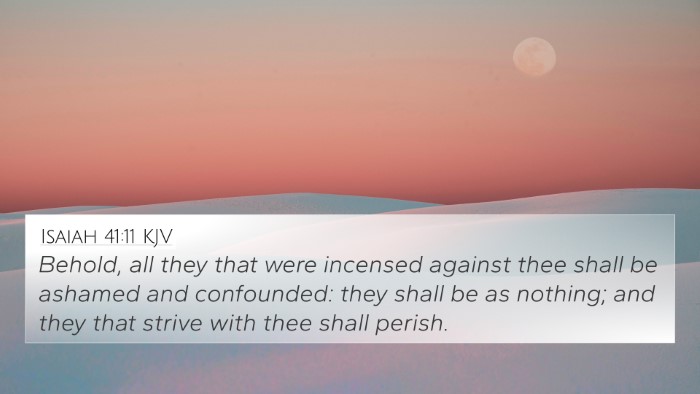Psalms 70:2 - Meaning and Interpretation
Psalms 70:2 states, "Let them be ashamed and confounded that seek after my soul: let them be turned back and brought to confusion that desire my hurt." This verse expresses a deep plea for deliverance from enemies and a desire for justice. The psalmist seeks God’s intervention against those who pursue him maliciously.
Contextual Analysis
This psalm is attributed to David, highlighting a period of distress where he implores God for help. Understanding the context of this verse is crucial as it reflects a key theme in Psalms: the reliance on God for rescue from adversaries.
Cross References
Many other Bible verses echo similar sentiments of pleading for safety and desiring justice against adversaries. Here are a few related cross-references:
- Psalms 35:4 - "Let those be put to shame and brought to dishonor who seek after my life." - This verse mirrors the desire for vindication from enemies.
- Psalms 40:14 - "Let them be ashamed and confounded together that seek after my soul to destroy it." - This parallel emphasizes the psalmist's recurring theme of seeking justice.
- Psalms 54:5 - "He shall reward evil unto mine enemies: cut them off in thy truth." - God’s retribution against enemies is a strong theme.
- Psalms 71:13 - "Let them be confounded and consumed that are adversaries to my soul." - A further plea for God to act against the psalmist's foes.
- Isaiah 41:11 - "Behold, all they that were incensed against thee shall be ashamed and confounded." - God's promise of justice resonates through the prophetic book.
- Lamentations 3:46 - "All our enemies have opened their mouths against us." - Relating to the struggles against those who oppose us.
- Romans 12:19 - "Vengeance is mine; I will repay, saith the Lord." - This New Testament verse ties back to trusting God for justice.
Interpretations from Renowned Commentaries
Matthew Henry
Matthew Henry emphasizes the fervent prayer aspect of this psalm, illustrating the desperation and earnestness of the psalmist. He notes that the shame sought for adversaries serves both as a comfort and a testimony of God’s justice.
Albert Barnes
Albert Barnes interprets this verse as a representation of righteous anger against those who seek harm. He points to the assurance found in divine deliverance, highlighting that the consequences faced by the enemies serve as a divine response to the psalmist's cries.
Adam Clarke
Adam Clarke discusses the emotional weight and urgency of the prayer. He sees the language as a gradient of appeal to God, displaying the psalmist's faith that God will protect and deliver him from those who wish to inflict harm.
Thematic Connections
This verse and its interpretations provide a rich opportunity for cross-referencing Biblical texts and engaging in a comparative Bible verse analysis. The themes of deliverance, justice, and divine intervention resonate not only throughout the book of Psalms but also connect deeply with other biblical narratives.
Practical Application
For anyone looking to understand Psalm 70:2 better, utilizing a Bible cross-reference guide can illuminate the connections between verses that address similar pleas for help or justice. Resources such as Bible concordances or chains of references can amplify one’s study experience, allowing an exploration of the thematic Bible verse connections surrounding this powerful scripture.
Conclusion
Psalms 70:2 serves as a reminder of the biblical truth that God supports those who are wronged and desires justice. Through various commentaries and related scriptures, believers can glean insights into their own struggles and understand God’s character more deeply. By engaging in cross-referencing Bible study methods, one can uncover profound interconnections among scripture that enhance spiritual development and understanding.
Further Study Suggestions
For those interested in exploring this theme further, consider examining the following:
- The impact of prophetic literature on Psalms.
- How New Testament teachings reconcile with Old Testament principles of justice.
- Links between emotional expressions in Psalms and teachings from the Gospels.










